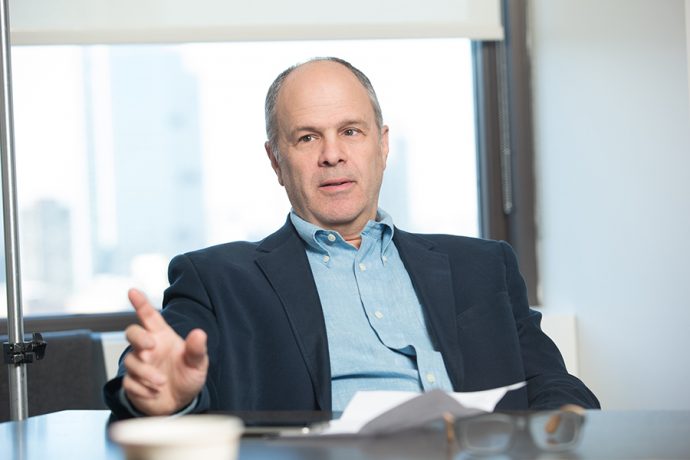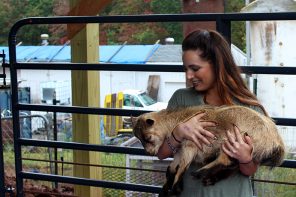If you love the arts and entertainment, then you’re no doubt a fan of “American Masters.”
For 31 seasons, the PBS series has been exploring culture with a capital “C,” in documentaries that have ranged beyond the arts to sports (pioneering tennis legends Althea Gibson and Billie Jean King) and the sciences (Albert Einstein).
“I think ‘American Masters’ is one of the few series dedicated to biography,” executive producer Michael Kantor says from the sleek Manhattan offices of WNET/Thirteen. “There are lots of shows that do history, trends and current events. We use as our maxim, ‘All history is biography.’ We are trying to unpack our cultural heritage and we do so through stories of people, whether they be (composer-conductor) Leonard Bernstein, (country music legend) Willie Nelson or Bob Hope.”

Comedian Hope — famed for his “Road” movies with Bing Crosby and Dorothy Lamour; his self-deprecating hosting of the Academy Awards and entertaining American troops through multiple wars — will be featured on “American Masters” in early December, with a two-hour director’s cut airing Dec. 29. Also coming this season are profiles of violin virtuoso Itzhak Perlman, once artistic director of the Westchester Philharmonic; Hedy Lamarr, the brainy movie siren who helped develop a wartime radio guidance system now used in Wi-Fi and Bluetooths; groundbreaking playwright Lorraine Hansberry, whose “A Raisin in the Sun,” one of America’s greatest plays, plumbs the bramble path of an upwardly mobile black family in segregated Chicago; entertainer and civil rights crusader Sammy Davis Jr., an integral member of Frank Sinatra’s Rat Pack; and Boston Red Sox left fielder Ted Williams, the last Major League Baseball player to bat .400 in a season.
“Williams had a Mexican-American heritage, which not many people know,” Kantor says.
Nor are they probably aware of Davis’ problems with the Internal Revenue Service. Without sensationalizing its subjects, “American Masters” is able to plumb their essence in programs that are in-house documentaries, collaborations or films that documentarians bring to Kantor. Such is the series’ reputation that Kantor and his team are given unprecedented access to their subjects. The Davis estate granted “American Masters” the rights to tell his story.
“They said we could do it. They didn’t tell us how to do it.”
For Kantor, “All documentaries are about trust. If there’s no trust, then it’s just reporting without the depth and the emotion. We’re…looking to move people, to engage them.”
And that includes young people who may be reluctant to enter the “time machine” that is
the series.
“I have three kids,” Kantor says. “I want to reach them where they live, not on TV but on their phones.”
That means streaming programs, doing podcasts — like the one related to the pre-Halloween broadcast of “Edgar Allan Poe: Buried Alive,” with actor Denis O’Hare reading Poe’s “The Raven” — and such web-only content as the Inspiring Woman Campaign (#InspiringWomanPBS), in which viewers can write about women who have changed their lives.
Kantor has loved the arts from a young age. He grew up in Orange, Connecticut, outside New Haven, the child of parents who were academically — and specifically scientifically — minded. His father, Dr. Fred Kantor, created a vaccine for Lyme disease. His mother, Linda, worked with the elderly. But their child believed with poet (and onetime Sarah Lawrence College teacher) Muriel Rukeyser that “the universe is made of stories, not atoms.”
“We’re all storytellers,” he adds. “That’s what makes the world go around.”
Kantor attended Cornell University and the University of California San Diego, where he earned a master’s degree in theater directing. (He’s a Tony Award nominator, which means he sees all the new Broadway shows.)
But his theatrical talents took a documentarian turn and he worked under Ken Burns with Stephen Ives. His projects have included the sweeping series “The West,” Ric Burns’ moving “New York: A Documentary Film” and the riveting “The Donner Party.”
Kantor joined “American Masters” in April 2014 and increased its scope with the establishment of American Masters Pictures in January 2016. That year, the new theatrical imprint was represented by three films at the Sundance Film Festival — “Maya Angelou: And Still I Rise,” “Richard Linklater — Dream is Destiny” and “Norman Lear: Just Another Version of You.” The last profiles the writer-producer who changed the face of TV with a group of 1970s comedies that featured prickly characters and equally thorny social issues.
Kantor found the 95-year-old Lear a challenge — and a delight.
“I spent enough time with him to realize he has way more energy than I do,” Kantor says. “As Phil Rosenthal, the creator of ‘Everybody Loves Raymond’ said, ‘There’s BN and AN — Before Norman and After Norman.’”
Still, Kantor is a guy on the go. Between making documentaries, attending Broadway shows and seeing performances at Manhattan’s Symphony Space, where wife Kathy Landau is executive director, he has little time for the family home in the Edgemont section of Greenburgh.
But he’s doing what he loves — engaging with new filmmakers, new stories and new ideas — and wouldn’t have it any other way.
“We work in cubicles here but I say, ‘if I had an office door, it would always be open.’”
“American Masters’” “Bombshell: The Hedy Lamarr Story” has its theatrical release Nov. 24. For more, visit pbs.org/americanmasters.





